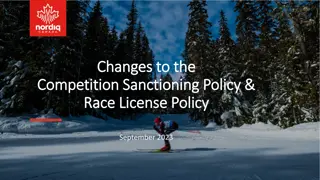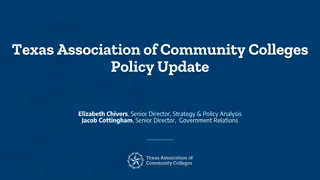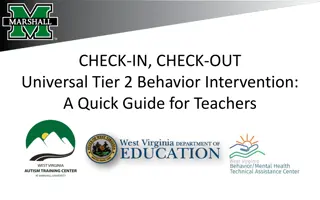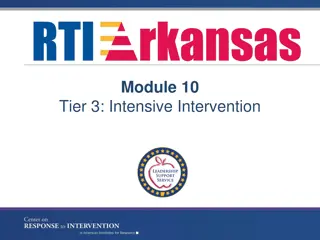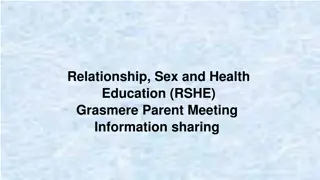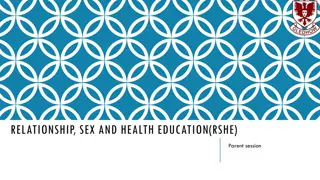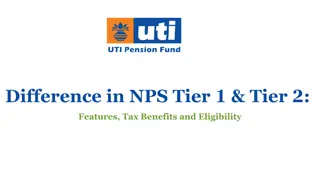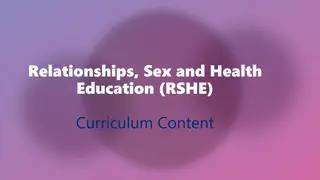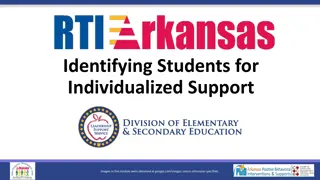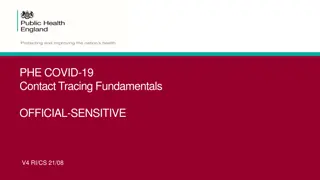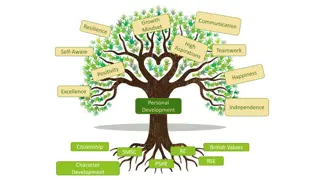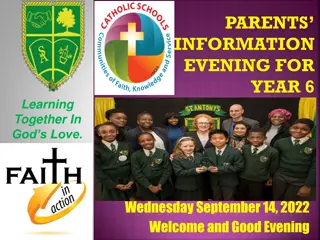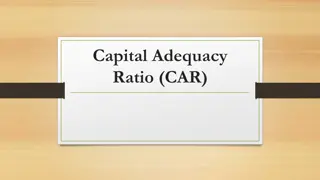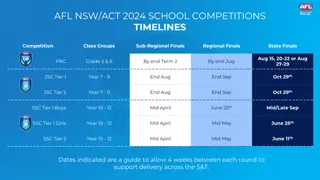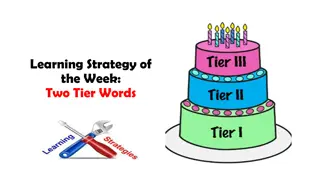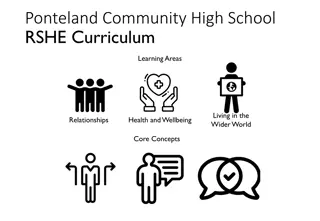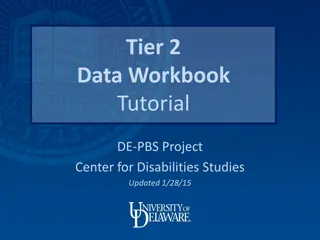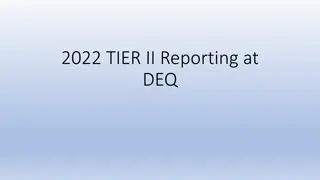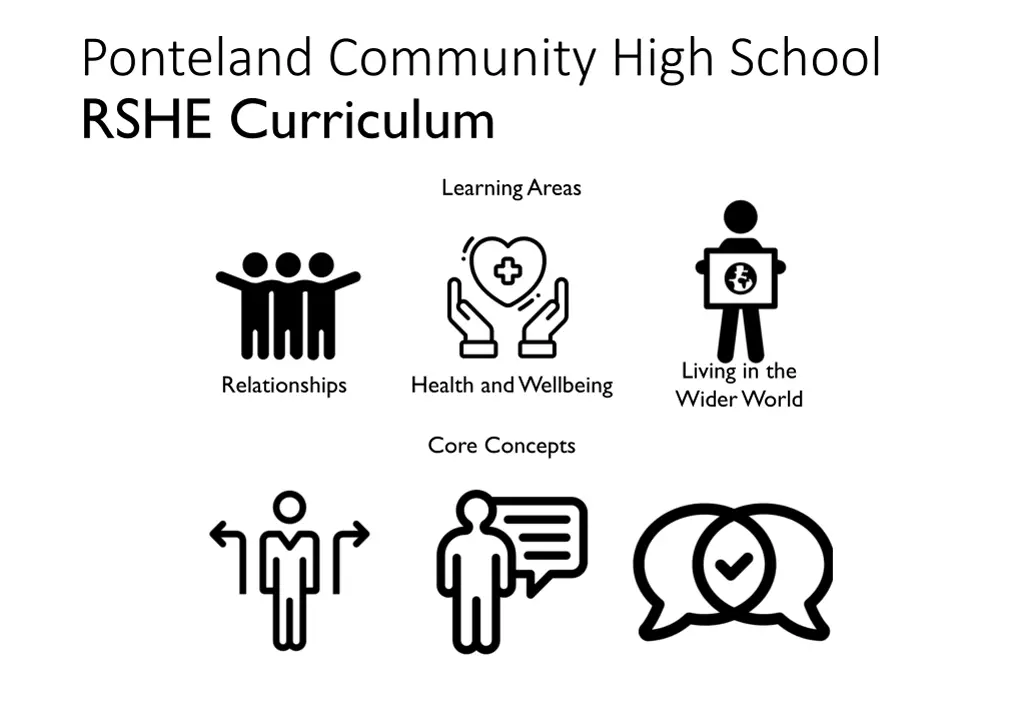
Ponteland Community High School RSHE Curriculum Overview
"Explore the RSHE curriculum at Ponteland Community High School, focusing on relationships, health, and wellbeing. Learn about developing positive relationships, understanding healthy intimate relationships, and promoting mental health. Discover how young people can make informed decisions, contribute positively to society, and prepare for the world of work. Enhance digital literacy skills and become equipped for a fair and equitable world. Dive into topics including material consumption online, online safety, and the law's protection of young people. Join the journey towards happy and healthy relationships and a balanced lifestyle."
Download Presentation

Please find below an Image/Link to download the presentation.
The content on the website is provided AS IS for your information and personal use only. It may not be sold, licensed, or shared on other websites without obtaining consent from the author. If you encounter any issues during the download, it is possible that the publisher has removed the file from their server.
You are allowed to download the files provided on this website for personal or commercial use, subject to the condition that they are used lawfully. All files are the property of their respective owners.
The content on the website is provided AS IS for your information and personal use only. It may not be sold, licensed, or shared on other websites without obtaining consent from the author.
E N D
Presentation Transcript
Ponteland Community High School RSHE Curriculum Learning Areas Living in the Wider World Relationships Health and Wellbeing Core Concepts
RSHE Curriculum 2022-23: Tier One Overview Focus Area Year 7 Year 8 Year 9 Year 10 Year 11 How can relationships go wrong? How can we avoid harms linked to his? How can I develop positive relationships in secondary school? What Why are families an important part of society? What are the features of healthy intimate relationships? challenges can relationships and families face? Unit 1 Autumn Relationships How can I make good decisions regarding alcohol, smoking and drugs? What choices do adults have linked to their health and wellbeing? How can I promote good mental health for myself and others? What steps can I take to be healthy and happy? How can I live a healthy and balanced lifestyle? Unit 2 Winter Health and Wellbeing How can young people be affected by material consumed online? How can my online life influence my view of the world? How can I contribute positively to society? How can I act safely and wisely online? How does the law protect young people? Unit 3 Spring Living in the Wider World How can I contribute to the world being a fair and equitable place? How can young people prepare for the world of work? How can I maximise my employability in the future? Unit 4 Summer Am I digitally literate?
Curriculum Overview Area 1: Relationships How can I develop positive relationships in secondary school? Why are families an important part of society? What are the features of healthy intimate relationships? How can relationships go wrong? How can we avoid harms linked to his? What challenges can relationships and families face? Year 7 Year 8 For our young people to have the knowledge, understanding and skills needed to participate in happy and healthy relationships. Year 9 Ranging from families to friendships and in time, more intimate relationships, we want our young people to be equipped for happy and healthy relationships. This will involve them developing a working understanding of the features of healthy relationships, as well as exposing them to some of the challenges that relationships face. Year 10 Year 11
Curriculum Overview Area 2: Health and Wellbeing Year 7 What steps can I take to be healthy and happy? Year 8 How can I live a healthy and balanced lifestyle? How can I make good decisions regarding alcohol, smoking and drugs? What choices do adults have linked to their health and wellbeing? How can I promote good mental health for myself and others? For our young people to have the knowledge, understanding and skills that support their positive physical and mental health. Year 9 Year 10 Our young people are faced with a significant range of decisions which have impact upon their physical and mental health. Through this learning sequence we intend to make our students aware of the range of opportunities and challenges they will be presented with as young adults. As well as this we will seek to inform them of the range of support that is available to them to support their good physical and mental health. Year 11
Curriculum Overview Area 3: Living in the Wider World How can I contribute to the world being a fair and equitable place? Year 7 How can I act safely and wisely online? How can my online life influence my view of the world? Year 8 Am I digitally literate? For our young people to have the knowledge, understanding and skills needed to be happy and productive citizens. How can young people prepare for the world of work? Year 9 How can I contribute positively to society? How can young people be affected by material consumed online? How can I maximise my employability in the future? Our young people are presented with a set of opportunities and challenges unique to previous generations. We want to equip our young people to harness the opportunities whilst managing the risks they face. We want to support our young people to achieve their ambitions and to live happily and productively Year 10 Year 11 How does the law protect young people?
Core Concepts Choice Communication Consent Faced with an array of different relationships and situations to negotiate, we want to equip our young people with the knowledge, understanding and skills required to communicate effectively. An important aspect of this is the ability to recognise and appreciate the perspectives of others as well as being able to in turn communicate one s own position. Likewise our young people need to be equipped to handle wisely the opportunities and risks associated with online communication and to understand how it mirrors, yet can also differ from person to person contact. Across all areas, we want our young people to be aware of where they can seek out support with challenges with face and give them the confidence to do so. In the range of different relationships our young people participate in, we want them to understand their responsibilities as consent-seekers as well as their rights as consent-givers. This will involve developing the knowledge, understanding and skills necessary to recognise the significance of consent across adult life. Whilst this has clear and significant ramifications for more mature, intimate relationships, we also want our young people to understand this core concept s impact across our friendships, families, online lives and employment. As our young people experience increasing maturity and responsibility for their decision making, we want to equip them with the knowledge, understanding and skills necessary to make wise choices. One element of this is through considering decisions and dilemmas before they occur to enable our young people to have considered their perspective in advance. Likewise, the ability to weigh likely consequences, be they good and bad as well as present and future is an essential skill for wise choice making.
Intimate and Sexual Relationships, including sexual health RSHE Curriculum Statutory Content Pupils should know Families how to recognise the characteristics and positive aspects of healthy one-to-one intimate relationships, which include mutual respect, consent, loyalty, trust, shared interests and outlook, sex and friendship. I 1 Pupils should know F 1 that all aspects of health can be affected by choices they make in sex and relationships, positively or negatively, e.g. physical, emotional, mental, sexual and reproductive health and wellbeing. that there are different types of committed, stable relationships. I 2 how these relationships might contribute to human happiness and their importance for bringing up children. F 2 the facts about reproductive health, including fertility, and the potential impact of lifestyle on fertility for men and women and menopause. I 3 what marriage is, including their legal status e.g. that marriage carries legal rights and protections not available to couples who are cohabiting or who have married, for example, in an unregistered religious ceremony. F 3 that there are a range of strategies for identifying and managing sexual pressure, including understanding peer pressure, resisting pressure and not pressurising others. I 4 why marriage is an important relationship choice for many couples and why it must be freely entered into. F 4 I 5 that they have a choice to delay sex or to enjoy intimacy without sex. I 6 F 5 the characteristics and legal status of other types of long-term relationships the facts about the full range of contraceptive choices, efficacy and options available. I 7 the roles and responsibilities of parents with respect to raising of children, including the characteristics of successful parenting. the facts around pregnancy including miscarriage. F 6 that there are choices in relation to pregnancy (with medically and legally accurate, impartial information on all options, including keeping the baby, adoption, abortion and where to get further help). I 8 how to: determine whether other children, adults or sources of information are trustworthy: judge when a family, friend, intimate or other relationship is unsafe (and to recognise this in others relationships); and, how to seek help or advice, including reporting concerns about others, if needed. F 7 how the different sexually transmitted infections (STIs), including HIV/AIDs, are transmitted, how risk can be reduced through safer sex (including through condom use) and the importance of and facts about testing. I 9 Respectful Relationships about the prevalence of some STIs, the impact they can have on those who contract them and key facts about treatment. Pupils should know I 10 the characteristics of positive and healthy friendships (in all contexts, including online) including: trust, respect, honesty, kindness, generosity, boundaries, privacy, consent and the management of conflict, reconciliation and ending relationships. This includes different (non-sexual) types of relationship practical steps they can take in a range of different contexts to improve or support respectful relationships. 1 11 how the use of alcohol and drugs can lead to risky sexual behaviour. R 1 how to get further advice, including how and where to access confidential sexual and reproductive health advice and treatment. 1 12 R 2 Drugs, Alcohol and Tobacco how stereotypes, in particular stereotypes based on sex, gender, race, religion, sexual orientation or disability, can cause damage (e.g. how they might normalise non-consensual behaviour or encourage prejudice). R 3 Pupils should know the facts about legal and illegal drugs and their associated risks, including the link between drug use, and the associated risks, including the link to serious mental health conditions. D 1 that in school and in wider society they can expect to be treated with respect by others, and that in turn they should show due respect to others, including people in positions of authority and due tolerance of other people s beliefs. R 4 D 2 the law relating to the supply and possession of illegal substances. about different types of bullying (including cyberbullying), the impact of bullying, responsibilities of bystanders to report bullying and how and where to get help. the physical and psychological risks associated with alcohol consumption and what constitutes low risk alcohol consumption in adulthood. R 5 D 3 that some types of behaviour within relationships are criminal, including violent behaviour and coercive control. R 6 D 4 the physical and psychological consequences of addiction, including alcohol dependency. D 5 awareness of the dangers of drugs which are prescribed but still present serious health risks. R 7 what constitutes sexual harassment and sexual violence and why these are always unacceptable. the facts about the harms from smoking tobacco (particularly the link to lung cancer), the benefits of quitting and how to access support to do so the legal rights and responsibilities regarding equality (particularly with reference to the protected characteristics as defined in the Equality Act 2010) and that everyone is unique and equal. D 6 R 8
RSHE Curriculum Statutory Content Online and Media Healthy Living Internet Safety and Harms Pupils should know Pupils should know Pupils should know their rights, responsibilities and opportunities online, including that the same expectations of behaviour apply in all contexts, including online. about online risks, including that any material someone provides to another has the potential to be shared online and the difficulty of removing potentially compromising material placed online. the similarities and differences between the online world and the physical world, including: the impact of unhealthy or obsessive comparison with others online (including through setting unrealistic expectations for body image), how people may curate a specific image of their life online, over- reliance on online relationships including social media, the risks related to online gambling including the accumulation of debt, how advertising and information is targeted at them and how to be a discerning consumer of information online. how to identify harmful behaviours online (including bullying, abuse or harassment) and how to report, or find support, if they have been affected by those behaviours. the positive associations between physical activity and promotion of mental wellbeing, including as an approach to combat stress. O 1 H 1 the characteristics and evidence of what constitutes a healthy lifestyle, maintaining a healthy weight, including the links between an inactive lifestyle and ill health, including cancer and cardiovascular ill-health. O 2 H 2 S 3 not to provide material to others that they would not want shared further and not to share personal material which is sent to them. about the science relating to blood, organ and stem cell donation H 3 O 3 how to maintain healthy eating and the links between a poor diet and health risks, including tooth decay and cancer. what to do and where to get support to report material or manage issues online. O 4 H 4 S 4 the impact of viewing harmful content. O 5 about personal hygiene, germs including bacteria, viruses, how they are spread, treatment and prevention of infection, and about antibiotics. H 5 that specifically sexually explicit material e.g. pornography presents a distorted picture of sexual behaviours, can damage the way people see themselves in relation to others and negatively affect how they behave towards sexual partners. Mental Wellbeing O 6 about dental health and the benefits of good oral hygiene and dental flossing, including healthy eating and regular check-ups at the dentist. Pupils should know H 6 how to talk about their emotions accurately and sensitively, using appropriate vocabulary M 1 that sharing and viewing indecent images of children (including those created by children) is a criminal offence which carries severe penalties including jail. how information and data is generated, collected, shared and used online. (late secondary) the benefits of regular self-examination and screening. H 7 O 7 that happiness is linked to being connected to others. M 2 the facts and science relating to immunisation and vaccination. H 8 how to recognise the early signs of mental wellbeing concerns. M 3 the importance of sufficient good quality sleep for good health and how a lack of sleep can affect weight, mood and ability to learn. H 9 Being Safe common types of mental ill health (e.g. anxiety and depression). M 4 Pupils should know basic treatment for common injuries. life-saving skills, including how to administer CPR. the purpose of defibrillators and when one might be needed. the concepts of, and laws relating to, sexual consent, sexual exploitation, abuse, grooming, coercion, harassment, rape, domestic abuse, forced marriage, honour-based violence and FGM, and how these can affect current and future relationships. H 10 how to critically evaluate when something they do or are involved in has a positive or negative effect on their own or others mental health. M 5 S 1 key facts about puberty, the changing adolescent body and menstrual wellbeing. H 11 the benefits and importance of physical exercise, time outdoors, community participation and voluntary and service-based activities on mental wellbeing and happiness. how people can actively communicate and recognise consent from others, including sexual consent, and how and when consent can be withdrawn (in all contexts, including online). the main changes which take place in males and females, and the implications for emotional and physical health. M 6 H 12 S 2
Year 7 Unit 1: Relationships How can I develop positive relationships in secondary school? As students begin Year 7 it can be a time of stress and change in their relationships. We want to equip students with the knowledge, understanding and skills to have healthy relationships in school, at home and with friends. Statutory Content Heading What are we learning? Why now? Key Questions Session Format We want to ease and support transition to secondary school and share key messages about wellbeing and health. What strategies can we adopt to improve our wellbeing? What support is available to me at secondary school? A session focused on the idea of being new to support transition into secondary school. Drop Down How can I make the best start to life in secondary school? 1 Across the unit we want to consider 3 key areas that students experience as significant friends, parents and teachers. Why does conflict sometimes occur at home? What are good strategies for resolving conflict at home? How can I enjoy good relationships with my important adults at home? A session to help students consider how best they can relate well to parents and carers. 2 Pastoral Students are getting used to a new group of adults supporting them, we want them to understand that for some challenges, the support of trusted adults will be essential. Who are trusted adults in school? When may I need the help of a trusted adult? A session focused on safeguarding and establishing trusting relationships. Drop Down 3 Who can I trust in school? 4 Pastoral Citizenship Focus Week We know that students can face challenges coming from a range of primary schools as friendships are created or change. We want to equip students to have healthy, positive friendships. How should we behave in different types of relationship? What strategies can we use if we feel things are not working well in a relationship? A session focused on the characteristics of healthy friendships. Drop Down What are the characteristics of healthy friendships? 5 6 Pastoral End of Unit Quiz
Year 7 Unit 2: Health and Wellbeing What steps can I take to be healthy and happy? Year 7 students are experiencing a time of significant personal change. We want to equip them with a knowledge and understanding of these changes as well as the skills to make good decisions to promote their mental and physical health during this stage of their life. Statutory Content Heading What are we learning? Why now? Key Questions Session Format In this first unit concerning health and wellbeing we want to emphasise the significance of mental health alongside physical health from the outset. A session designed to explore the concepts of physical and mental health and to share 5 ways to wellbeing . How are mental and physical health similar and different? How can I be proactive about my mental health? Drop Down How can I promote my mental health during secondary school? 1 Our young people will be taking increasing personal responsibility for their hygiene. We know from experience that some students find this easier than others. We want all students to be well informed to make good decisions in this area. Why is personal hygiene important? How can poor personal hygiene lead to the spread of virus and infections? Why is personal hygiene an important aspect of being healthy? A session designed to reinforce key messages about personal hygiene. 2 Pastoral A session designed to explore the different implications of puberty for boys and girls, and an exploration of strategies to support students advancing through puberty. We want to provide timely advice to students going through puberty as well as reassurance to students that this process occurs at different times and in different ways for each individual. What changes occur during puberty? How can I manage the effect these changes will have on my relationships? Drop Down How does the body change during puberty? 3 4 Pastoral Session 2 continued A session designed to allow students to explore the components of good oral health, and supporting strategies to improve oral health. We want our students to maintain (or develop) better oral health to prepare for long term health benefits in Year 7 and beyond. Why is oral health important at a young age? How can we better protect our teeth and oral health? Drop Down Why is oral health an important aspect of being healthy? 5 6 Pastoral End of Unit Quiz
Year 7 Unit 3: Life in the Wider World How can I act safely and wisely online? As students access online material with increasing independence we want them to be prepared with the knowledge, understanding and skills necessary for wise decision making in their online lives. Statutory Content Heading What are we learning? Why now? Key Questions Session Format We want to equip students to have a critical relationships with social media that enables them to harness its benefits whilst taking wise precautions against its harms. What are the positives and negatives of social media for young people? What steps can we take to act wisely in our online lives? A lesson designed to examine the role of social media in the lives of young people. Drop Down Is social media a good thing or a bad thing? 1 2 Pastoral Follow Up Experience from previous years illustrates a concern for students asking for or sending inappropriate images. We want to educate them at a timely point around the dangers of this. How is peer pressure online different to in person? What is the law in relation to online image sharing? What are the implications of sharing images online? A lesson designed to investigate the concept of peer pressure online and the dangers of mage sharing. Drop Down What are the dangers of sharing images online? 3 4 Pastoral Follow Up Historically, the most prevalent issue in school regarding internet use is cyberbullying. We want to ensure all students have received clear messages regarding this issue. What do we mean by cyberbullying? What strategies can we develop to support ourselves or others who are affected by cyberbullying? A lesson designed to explore the concept of cyberbullying including how to prevent it and support those who are victims of it. Drop Down How can we prevent cyberbullying? 5 6 Pastoral End of Unit Quiz
Year 7 Unit 4: Life in the Wider World How can I contribute to the world being a fair and equitable place? We wish for our students to be courageous moral citizens who challenge bullying, prejudice and discrimination. This unit seeks to build their knowledge and understanding of how and why some are unfairly treated and equip them with the desire and skills to be upstanders rather than bystanders when others are being treated harmfully. Statutory Content Heading What are we learning? Why now? Key Questions Session Format We want to introduce the protected characteristics so that they have a deeper understanding of these important definition from the Equality Act 2010. A lesson designed to explore equality and the protected characteristics defined in the Equality Act 2010. What is equality and why is it important? What are the protected characteristics in law? Drop Down How does the law seek to promote equality? 1 2 Pastoral Follow Up Building from the previous session we want to build students awareness of the ways that groups or individuals can face with regards to prejudice and discrimination. What are prejudice and discrimination and how do they affect society? What steps can we take to challenge prejudice and discrimination? Drop Down Why do some people face prejudice and discrimination? A lesson to examine the harmful nature of discrimination. 3 4 Pastoral Follow Up We want to examine the concepts of prejudice on a more personal level and make students aware of their opportunities to be an upstander when they witness it. This in turn will link well to work from the previous unit concerning life online. What bullying do some people face? What is the difference between an upstander and a bystander? How should I respond in challenging situations? A lesson designed to examine the concept of by-standing and how to stand up for others facing mistreatment. Drop Down Am I an upstander or a bystander? 5 6 Pastoral End of Unit Quiz
Year 8 Unit 1: Relationships Why are families an important part of society? In society and our school community there are a range of different types of committed, stable relationships. In this unit we want to promote students knowledge of, and respect for a range of different family units. In turn we want to promote the understanding and skills students need to be positive members of their own family units. Statutory Content Heading What are we learning? Why now? Key Questions Session Format Our students come to us from a variety of different family types, we wish to share those family types and challenge prejudice regarding traditional family stereotypes. A lesson designed to explore the different types of family and the legal status of different family types. What different types of family relationship exist? What is the legal status of different types of relationship? Drop Down What different types of families are there? 1 We recognise that adopted and foster families are an important part of our school community, in this unit focused on family we want to ensure they are recognised and considered. Why may people choose to foster or adopt? What benefits does this bring adults and children? A session designed to examine the benefits of, and reasons for people to adopt or foster. Why may people choose to foster or adopt? 2 Pastoral What are the components of a happy marriage? What legal protections and benefits does marriage provide? We want students to begin to understand the legal status of marriage and the benefits this legal status brings. A lesson designed to focus on the concept of marriage and its legal status. Drop Down Why is marriage an important choice for many? 3 4 Pastoral Citizenship Focus Week Year 8 students sometimes face conflict as they seek to express their independence from their parents. We want to help them consider what it is like to be a parent as well as how to relate well to their own significant adults. What are the responsibilities associated with parenting? What might the challenges of being a new parent be? A lesson designed to identify the roles and responsibilities of parenting. Drop Down What are the roles and responsibilities of parents? 5 6 Pastoral End of Unit Quiz
Year 8 Unit 2: Health and Wellbeing How can I live a healthy and balanced lifestyle? Year 8 students have increasing independence in regards to their lifestyle. We know that this is an age where some, particularly girls, fall away from participation in regular exercise and sport. We want to equip students with a knowledge and understanding of the components of a healthy lifestyle, as well as encouraging them with the desire and skills to make good decisions when faced with choices in this area. Statutory Content Heading What are we learning? Why now? Key Questions Session Format We want to build on concepts covered in Year 7 with building students awareness and ability for improved decision making in relation to health. What are the most important factors in determining a healthy lifestyle? How do personal choices influence my lifestyle? A lesson designed to consider the key elements of a healthy lifestyle. Drop Down What are the key components of a healthy and balanced lifestyle? 1 We know that students may begin to opt out of sport at this age and want to share the range of ways that exercise can benefit their health. How does exercise benefit my physical and mental health? What type of exercise do I enjoy? A lesson designed to share the physical and mental health benefits of regular exercise. How can exercise benefit my physical and mental health? 2 Pastoral We are aware from parent feedback and the culture more broadly that students receive a range of messages regarding food and diet. We want our students to have a positive and healthy relationship with food. What are the key components of a healthy diet? Why is having a healthy diet significant? Why is a healthy diet an important part of a healthy and balanced lifestyle? A lesson designed to inform and challenge the students as to the features of a healthy diet. Drop Down 3 4 Pastoral Session 2 continued. We know from parent feedback that students in this age range can find managing distractions (such as gaming or phone use) a challenge which can result in poor sleep patterns. What are the key impacts of sleep deprivation? Why is good sleep hygiene important? A lesson designed to examine the physical and emotional impacts of sleep deprivation. Drop Down Why is sleep an important part of a healthy and balanced lifestyle? 5 6 Pastoral End of Unit Quiz
Year 8 Unit 3: Life in the Wider World How can my online life influence my view of the world? As students access online material with increasing independence we want them to be prepared with the knowledge, understanding and skills necessary for wise decision making in their online lives. In this unit we will particularly focus on the influence online life can have on students self esteem and body image. Statutory Content Heading What are we learning? Why now? Key Questions Session Format Feedback from parent illustrates that Year 8 students are often careless and cruel with the nature of some online posts. We aim to address this by examining what can be tracked and shared with others. How safe and secure is the information I post online? What information can be tracked and shared with others? Drop Down Does social media represent who I really am? A lesson designed to explore the consequences of posting online. 1 2 Pastoral Follow Up Year 8 students are forming a wealth of different relationships, many of them online. They can be easily influenced by what they see and develop false perceptions of reality. Does social media always accurately represent reality? Why is self esteem significant? How can I promote and protect my own self esteem? A lesson focused on the concept of self esteem and how this may be affected by consumption of online media. Drop Down How can online images affect my self esteem? 3 4 Pastoral Follow Up Participation in online platforms such as Instagram and Tiktok may give our young people unrealistic expectations of physical appearance with potential effects for their mental wellbeing. How are young people influenced by the media regarding body image? Why are some of these influences potentially harmful? A session focused on body image and how this can be affected by social media. Drop Down How can use of social media affect my body image? 5 6 Pastoral End of Unit Quiz
Year 8 Unit 4: Life in the Wider World Am I digitally literate? Our young people consume online media with increasing volume and independence. We want to equip our young people with the knowledge, understanding and skills to be able to be digital citizens who are able to navigate the complexities of online media wisely. Statutory Content Heading What are we learning? Why now? Key Questions Session Format Students consume a range of information from multiple sources. We know across society young people are moving away from traditional news sources. As such they are placed at risk of being vulnerable to false information. A lesson focused on the dangers of fake news and the skills needed to distinguish between real news and fake news. What are the dangers of fake news? How can I distinguish between real news and fake? Drop Down How can I distinguish between fake news and real news online? 1 2 Pastoral Follow Up We are aware in society that young people can be victims of online grooming by radical groups or points of views. We want our young people to be aware that there are potential bad actors online that they need to be aware of. What do we mean by radicalisation and grooming? What steps can an individual take to be safe from bad actors online? A lesson focused on how online resources can lead to young people being groomed by radical groups. What are the dangers of radicalisation and grooming online? Drop Down 3 4 Pastoral Follow Up Even within conventional games there are elements that contain an element of gambling (e.g. paying for loot boxes in fortnite). We want our students to be aware of What are the risks of online gambling and gaming? How can I protect myself against online risks? Drop Down How can I manage risks linked to gambling and gaming online? A lesson focused on the risks of online gambling and gaming 5 6 Pastoral End of Unit Quiz
Year 9 Unit 1: Relationships What are the features of healthy intimate relationships? Experience shows that a number of students will be engaging in sexual experimentation from this age. We want to equip students at a timely stage with the knowledge, understanding and skills they need to ensure that their relationships are healthy, caring and safe. Year 9 parents are contacted to make them aware of this unit and have a legal right of withdrawal from it. Statutory Content Heading What are we learning? Why now? Key Questions Session Format What are the features of a healthy relationship? What is the law concerning young people and intimate relationships? How can we get support in a negative relationship? We want to educate students in a timely manner concerning healthy intimate relationships. We know in some cases that as puberty develops that the first tentative relationships can begin in this age bracket, and that without education they may lack empathy and care. A lesson designed to focus on the features of a healthy relationship and to be able to identify and challenge behaviours in relationships that are harmful Drop Down What are the characteristics of healthy intimate relationships? 1 Building on from the first session we want to ensure students are well informed of the risks regarding STIs and how these risks can be avoided. What are STIs and how are they transmitted? How can I protect myself against infection? A pair of sessions designed to investigate sexually transmitted infections and risk reduction. How can sexually transmitted infections affect your health? 2 Pastoral A lesson focused on understanding the significance of thinking carefully about contraception within intimate relationships. Having begun to consider intimate relationships and the dangers of STIs it is essential that our students are well informed regarding contraceptive methods. Why is thinking carefully about contraception significant? What contraceptive methods are available? Drop Down What choices can couples make about contraception? 3 4 Pastoral Citizenship Focus Week Building on from previous sessions we want to help students consider how peer pressure may affect our perceptions of relationships with consequences for how we behave. How can peer pressure affect relationships? How can pressure within relationships affect them? What strategies can we use to manage pressure concerning relationships? A lesson designed to identify and manage sexual pressure and to reinforce key messages regarding consent. Drop Down How can I identify and manage pressure in relationships? 5 6 Pastoral End of Unit Quiz
Year 9 Unit 2: Health and Wellbeing How can I make good decisions regarding alcohol, smoking and drugs? Year 9 students will be experiencing increasing freedom in their social lives which allows opportunities with experimentation with a range of substances. We want our students to have a clear grounding in the potential effects of this in order to equip them for wise decision making in this area of their lives. Statutory Content Heading What are we learning? Why now? Key Questions Session Format What are the short and long term consequences of addiction to tobacco and / or nicotine? How can I avoid peer pressure to smoke / vape? Historically, tobacco has often been the first substance experimentation faced by secondary-aged children. In recent times nicotine products such as vapes have also increased in popularity. What are the dangers linked with addiction to tobacco and nicotine? A lesson investigating the health dangers around tobacco and nicotine products. Drop Down 1 How can addiction affect my physical and mental health? What support is available for those affected by addiction? How can substance addiction affect my physical and mental health? A lesson to outline the affects that substance addiction can have. We want students to have an understanding of a core concept from this unit addiction. 2 Pastoral A lesson to investigate the harmful potential of alcohol and how risk-taking behaviour is altered under the influence of alcohol. Year 9 students are likely to begin experimentation with alcohol, we aim to broaden awareness of the effects of alcohol, and investigate risk-taking behaviour. What are the risks associated with consumption of alcohol? How can consuming alcohol lead to risky behaviours? Drop Down How can alcohol consumption link to risk taking behaviours? 3 Ahead of the upcoming session, we want students to understand the differences between legal and illegal substances as well as noting that some substances are legal but regulated. Why are some substances legal and others illegal? Are there risks associated with legal substances? A lesson to introduce the difference in law between legal and illegal substances. Why are some drugs legal, and others illegal? 4 Pastoral We wish to introduce a lesson that focus students attention on the potential impacts of substance abuse on their overall behaviour and the potential consequences it could lead to. We know anecdotally and through occasional pastoral issues that experimentation with illegal substances can be a feature of exploring teenage independence for students A lesson to investigate the harmful potential of drugs and how risk-taking behaviour is altered under the influence of substances? How can substance misuse lead to risk taking behaviour? How can I identify and manage peer pressure linked to the use of substances? Drop Down What are the risks linked to substance abuse? 5 6 Pastoral End of Unit Quiz
Year 9 Unit 3: Life in the Wider World How can I contribute positively to society? We desire for our students to be active contributors to their communities and to society at large. In this unit we want to draw students attention to some of the ways society can be damaged by the mistreatment of some. In turn we want to share the benefits of active participation in communities and the benefits this can bring for our mental health and wellbeing. Statutory Content Heading What are we learning? Why now? Key Questions Session Format We know that in society that stereotypes can lead to harms such as normalising prejudice or discriminatory behaviours, we want students to be aware of this to be able to counteract this. A session focused on the impact of stereotypes (for example those focused on age) and the harms they can do. What are stereotypes? What are prejudice and discrimination? What harms can they cause? Drop Down How can stereotypes cause damage? 1 2 Pastoral Follow Up We know that in society and in school students can feel isolated due to their gender or sexual identity. We want to support all students to handle this issue in a wise and caring way. Why can some groups face particular discrimination? How can we best support all members to feel happy and safe in our school community? A session focused on the dangers of homophobia and linked prejudice and the harms this can cause to others. Why do some people face prejudice based on gender or sexual identity? Drop Down 3 4 Pastoral Follow Up This session introduced broader aspects of students wellbeing and development through social and community participation. We want our students to understand and link good mental health to choice and lifestyle variety. What opportunities are open to me in relation to participating in my community? What impact does wider involvement have on my mental wellbeing? A lesson designed to allow students to explore how they can develop better mental health through community participation and other activities. Drop Down What are the benefits of active participation in my community? 5 6 Pastoral End of Unit Quiz
Year 9 Unit 4: Life in the Wider World How can young people prepare for the world of work? Statutory Content Heading What are we learning? Why now? Key Questions Session Format Over the next two years students are going to need to think with increasing clarity about their future plans. To help them to do so having an accurate picture of the jobs market in our region is a useful tool. A lesson focused on the key features of the North East jobs market using LMI (Labour Market Information) What is LMI (labour market information) What does LMI reveal about the jobs market in our region? Drop Down What are the features of the North East Labour Market? 1 2 Pastoral Follow Up What key transferable skills will benefit my future career path? How can I begin to develop these skills now? A lesson considering transferable skills for enterprise and employability that young people can develop now. We want to draw students attention to the transferable skills and experiences they can develop during their time in school Drop Down What skills for enterprise and employability do I need? 3 4 Pastoral Follow Up We know that at times young people post online without forethought or consideration of the potential consequences. We want to make them aware that material posted online for a public audience may have consequences into the future. Who can be affected by the things that I post online? How might my online activity make a difference to my career prospects? A lesson considering the idea of digital footprint and one s personal brand and how this can affect someone s employability. Drop Down How can my digital footprint affect my employability? 5 6 Pastoral End of Unit Quiz
Year 10 Unit 1: Relationships How can relationships cause harm? How can we avoid this? Sadly, sometimes intimate relationships can be a source of harm and abuse. Building on Year 9 s work identifying the features of healthy and harmful relationships we want our students to be aware of how relationships can lead to harm and the steps that they can take to protect themselves and others. Statutory Content Heading What are we learning? Why now? Key Questions Session Format Sadly, domestic abuse is a reality of some relationships including those that our students experience. We want to introduce the broad concept of abuse in relationships at the outset of this topic. What is domestic abuse and how does it affect families? What skills and strategies can we develop to respond appropriately in challenging relationships? A lesson examining the concept of domestic abuse and the role students can have in supporting one another. Drop Down What is domestic abuse and how does it affect families? 1 2 Pastoral Follow Up We know from the Everyone s Invited survey that many students experience sexual harassment in schools. We want to develop our students understanding of this and ability to challenge unacceptable behaviours. What is sexual harassment? Why do some wrongly believe certain behaviours are acceptable? How can we identify and challenge these behaviours? A lesson examining the features of sexual harassment that seeks to challenge the idea that certain behaviour are acceptable. Drop Down What is sexual harassment and why is it unacceptable? 3 4 Citizenship Focus Week Building on the concepts covered previously, we want to further develop an understanding of characteristics of less healthy relationships by examining coercive control. What do we mean by coercive behaviour? What are the signs of coercive behaviour and what might we do if we notice them? What is coercive control and how can we identify and confront it? A lesson designed to examine the nature of coercive control in unhealthy relationships. Drop Down 5 6 Pastoral End of Unit Quiz
Year 10 Unit 2: Health and Wellbeing What choices do adults have linked to their health and wellbeing? Students are reaching an age where they will have increasing independence and self-autonomy with regards to decisions concerning their health. This unit seeks to equip young people with the knowledge and understanding they will need to make important choices regarding their health and wellbeing. Statutory Content Heading What are we learning? Why now? Key Questions Session Format How can I monitor my own mental health? What steps can I take if I am concerned about my mental health? We know that GCSE study can be a stressful time for young people and we want to equip them for good mental health during this time period? A session focused on being able to recognise the early signs of mental wellbeing concerns and the steps one can take Drop Down How can I promote good mental health in myself and others? 1 We know that in society there has been a raised profile of discussion regarding vaccinations linked to COVID-19 and the MMR jab. We want to equip students to make their own decisions in these areas. How do vaccines seek to work? How can I make decisions regarding vaccinations? A session focused on the facts relating to immunisation and vaccination. 2 Pastoral Why are vaccinations significant? As students approach independence they will have the opportunity to become blood or organ donors, we want students to understand the choices they face in these areas. How does organ, blood and stem cell donation work? Should these be opt in or opt out processes? A session focused on the science relating to blood, organ and stem cell donation. Drop Down 3 Should I donate my organs? We are aware that self-examination and screening is a key tool in monitoring one s own health. We want to help students to understand why and how they can do this. A session to highlight the benefits of regular self-examination and screening. What warning signs can I monitor with self-examination and screening? Why is self-examination and screening important? 4 Pastoral We want students to have the knowledge, understanding and skills to help if faced with a first aid emergency including being able to administer CPR. How can I respond to incidents requiring first aid in a way that is safe and helpful? Drop Down How can I perform basic first aid on others? A session to share strategies for basic first aid. 5 6 Pastoral End of Unit Quiz
Year 10 Unit 3: Life in the Wider World How can young people be affected by material consumed online? We know that our Year 10 students will be consuming online material with increasing independence and that this can sometimes put them at risk of harmful content. In this unit we will consider 3 key issues that prevent potential danger with the aim of our young people having the knowledge, understanding and skills required to protect themselves from dangers. Statutory Content Heading What are we learning? Why now? Key Questions Session Format How can we identify when someone has a gambling problem? What strategies exist to support someone with a gambling problem? As students gain increased access to both the internet and disposable income, we know they may become vulnerable to gambling issues. A lesson designed to investigate the potential dangers of unregulated online gambling. Drop Down How can young people be affected by gambling? 1 For many of our young people, gaming will be a significant part of their routine. We know from pastoral issues raised that when this become obsessive or all consuming it can present issues. What are the positives and negatives linked to online gaming? How can I manage online gaming in a wise way? A lesson designed to consider the positives and negatives of gaming for young people. How can gaming affect young people? 2 Pastoral From issues raised in school as well as society, we recognise that pornography and sexting can have significant and harmful effects. What are the potential dangers of pornography and sexting? How can I make wise decisions this area? A lesson designed to consider the impacts of pornography and sexting on students relationships, self-esteem and body image. Drop Down 3 Pornography We know that unhealthy comparison can be an outcome of students consuming online material. Does social media give an accurate picture of reality? How can I make wise choices that protect my self-esteem? A lesson focused on the affects of social media on young people s body image and self esteem. How can social media distort ideas about body image 4 Pastoral Year 10 students need a wide understanding of internet safety and potential harmful behaviours. This lesson further investigates on-line behaviour we might associate with older students. What is cyberstalking and how does it manifest? What impact can it have on young people? What support is available for young people affected? A lesson designed to focus on the features of cyberstalking and to investigate it s harmful consequences. Drop Down 5 Cyberstalking 6 Pastoral End of Unit Quiz
Year 10 Unit 4: Life in the Wider World How can I maximise my employability in the future? At the end of year 10 students are at an important point in their journey towards careers. At the end of year 11 they will face important decisions as to what post-16 routes to pursue. Many will also be considering part time work to accompany their studies. We want students to be well equipped with the necessary knowledge, understanding and skills to make these decisions. Statutory Content Heading What are we learning? Why now? Key Questions Session Format Over the next year students will face important decisions about the study path they wish to follow post-16. We want students to be as well informed as possible in order to make good decisions. A session focused on introducing students to the different post 16 options routes they will have to choose from. What post-16 option routes are available? Which route is right for me? Drop Down 1 Post 16 Options 2 Pastoral Follow Up Many students will be considering part time work to support their studies. Likewise, in time, all will be looking to access the world of work and need equipping with knowledge and skills linked to presenting yourself on paper and in person. A lesson considering the steps individuals take in order to find and gain employment. How do I find out what jobs are available? How do I get a job? Drop Down 3 Job Application Processes 4 Pastoral Follow Up As students consider part time work and their future careers, they will benefit from a realistic understanding of what the world of work entails. This will include their rights and responsibilities as employees.. What is the life like as an employee? What are the rights of employees? What are the responsibilities of employees/ A lesson to encourage students to consider the reality of the workplace and their rights and responsibilities as employees. Drop Down Rights and Responsibilities of Employees 5 6 Pastoral End of Unit Quiz
Year 11 Unit 1: Relationships What challenges can relationships and families face? In this final unit of our Relationships Curriculum we want to convey some key messages regarding the challenges that relationships and families face. This includes ensuring students have a realistic knowledge and understanding of issues regarding fertility, pregnancy and parenting. We want students to be able to use this knowledge and understanding in order to make wise decisions that contribute to them having happy and healthy relationships in the future. Statutory Content Heading What are we learning? Why now? Key Questions Session Format Before many students leave school in year 11 we want to take the opportunity to share information regarding fertility that they may not receive from other sources. A lesson to convey key facts about reproductive health including fertility. What is reproductive health ? What factors can affect my reproductive health? Drop Down What do we mean by reproductive health ? 1 2 Pastoral Follow Up Year 11 students may be involved in sexual relationships where pregnancy is a possibility. We want students to have an awareness of key facts regarding pregnancy. How can unplanned pregnancies occur? What are miscarriages? What options are available to young people who are pregnant? A lesson designed to investigate teenage pregnancy, miscarriage, options and advice. Drop Down What challenges can pregnant young people face? 3 4 Citizenship Focus Week As Year 11 students may fall pregnant, we wish to ensure that they are fully aware of the roles of parenting, as well as the costs and challenges of parenting. What are the responsibilities associated with parenting? What are the costs of being a new parent? A lesson designed to identify the roles and responsibilities of parenting. Drop Down What are some of the challenges that parents face? 5 6 Pastoral End of Unit Quiz
Year 11 Unit 2: Health and Wellbeing How can I promote good mental health for myself and others? Throughout our health curriculum we have sought to give issues of physical and mental health equal status and emphasis. In this final unit we recognise the particular challenges Year 11 and the transition to adult life can present to our students mental health and equip them with the knowledge, understanding and skills to promote positive mental health in the months to come. Statutory Content Heading What are we learning? Why now? Key Questions Session Format Stress management is crucial in Year 11 as experience shows us that many of our students see worries regarding exams spike around mock exams and the significant preparations for their summer exam series. What are the warning signs of stress and anxiety? What strategies can we develop to better manage stress? A lesson designed to investigate stress management around exam preparation. Drop Down What strategies can I use to manage stress? 1 2 Pastoral Follow Up Sadly, we all experience grief and bereavement, however many lack a framework for talking about grief. This session seeks to support students in talking about grief in a helpful and constructive way. How can change, loss and bereavement affect people? What is grief? How might different people grieve? What strategies can help manage change, loss or bereavement? A lesson about the effects of change, loss and grief, and strategies for managing these and accessing support. Drop Down How can I respond to change, loss and grief? 3 4 Pastoral Follow Up Year 11 students may be about to engage in part time employment to support their studies. We know that financial concerns can be a cause of stress and concern for many. We want to equip young people with the skills they need to manage their money well. A lesson designed to examine the importance of personal financial management What is personal finance? Why is budgeting important? How can I manage a budget? Drop Down How can I manage my money in a healthy way? 5 6 Pastoral End of Unit Quiz
Year 11 Unit 3: Life in the Wider World How does the law protect young people? There are important safeguarding messages we need to share with our oldest students, particularly as we will lose contact with some of them in the next year. We want to arms them with information in relation to specific examples. We will focus on the dangers of county lines drug supply, gang culture, radicalisation and harassment. Statutory Content Heading What are we learning? Why now? Key Questions Session Format We know that in our local region and beyond young people can be affected by gang culture and drawn into County Lines drug supply. We want to equip young people with an understanding of this to be able to stay safe. What is gang culture and county lines? What steps can I take if I am concerned regarding this? How can I keep myself safe in relation to potential abuses from adults? A lesson designed to examine examples of how young people are protected in law. Drop Down 1 2 Pastoral Follow Up We know that young people can be vulnerable to radicalisation and that certain aspects may be more prevalent in society at any given time (e.g. incel culture). A session designed to outline the potential dangers of radicalisation from a range of sources. What is radicalisation? What support is available for victims of radicalisation? Drop Down What is radicalisation and how can it be avoided? 3 4 Pastoral Building on previous work in our relationships curriculum this session offers opportunities to reinforce central messages about healthy relationships. What are sexual harassment and stalking? What support is available to victims of sexual harassment and stalking? A lesson designed to explore sexual harassment and stalking and how young people are protected by the law. Drop Down How does stalking and harassment affect people? 5 6 Pastoral End of Unit Quiz

